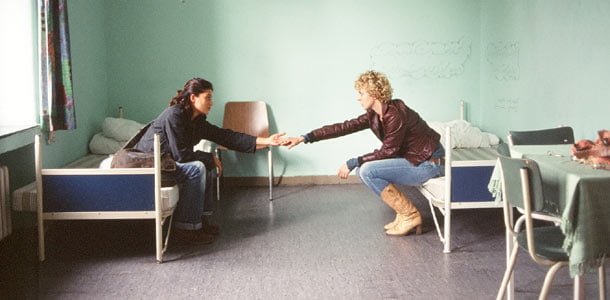The Edge of Heaven

An old man hires a prostitute to be his live-in companion. A young revolutionary flees political persecution in Istanbul, travels to Bremen to find her mother and falls in love. A mother journeys to Istanbul to learn about her daughter’s untimely and violent death. These and the lives of others will cross paths as they all voyage to “The Edge of Heaven.”
Laura's Review: A+
Like France's Tunisian born Abdellatif Kechiche ("Games of Love and Chance," "The Secret of the Grain"), German writer/director Fatih Akin ("Head-On"), born of Turkish parents, has been exploring the immigrant experience in Europe, but Akin's latest masterwork may also mark him as the man to inherit the mantle of the late, great Krzysztof Kieslowski. In "The Edge of Heaven," Akin basically follows two separate stories with six main characters whose lives become intertwined and paralleled, usually without their knowledge. Yeter (Nursel Köse), works in Germany as a prostitute named Jessy to pay her daughter's Turkish university bills but tells daughter Ayten (Nurgül Yesilçay) she works in a shoe store. In Turkey, Ayten is a revolutionary who must go underground as a college student named Gül. The first of the film's three segments is titled "Yeter's Death" and we old Ali (Tuncel Kurtiz) come to her 'rescue,' taking her from her life of prostitution but subjecting her to loutish drunkenness. His son, Nejat (Baki Davrak) is a professor of German literature whose guilt over his father's deeds leads him to Turkey to search for Yeter's daughter. In the second segment, titled "Lotte's death," we see Ayten leave Turkey for Germany in search of her mother. She is befriended by Charlotte (Patrycia Ziolkowska) who gives her a home and becomes her lover, much to her conservative mother, Susanne's (Hanna Schygulla, "The Bitter Tears of Petra von Kant," "The Marriage of Maria Braun") disapproval. Tragedy ensues and the German mother who has lost her daughter comes to the aid of the Turkish daughter who does not know of her own mother's death. Yeter and Lotte's coffins pass each other in the airport as one heads home to Turkey from Germany, the other to Germany from Turkey. Akin's film is studded throughout with shots of characters in cars, on trains, on ferries, in planes to emphasize his characters's roots in two places. The chance of fate is agonizing as characters unknowingly come this close to finding each other (Nejat posts a photo of Yeter in the German bookstore he buys in Istanbul, then rents a room to Lotte as she fights for Ayten's freedom. But, of course, she uses Ayten's alias when speaking to Nejat, so the connection is never made. The suspense is agonizing in its utter sadness.) Akin also shows connections to another great filmmaker, Rainer Werner Fassbinder, in his casting of Schygulla and his character of Arab immigrant Ali (reference "Ali: Fear Eats the Soul"). The film is beautifully photographed by Rainer Klausmann ("Head-On," "Downfall"). Watch for the use of color, particularly where Lotte is surrounded by red in a phone booth. The film's simple, closing shot pulls the film's themes of sacrifice, forgiveness and love of adopted country together in an extraordinarily satisfying way.

